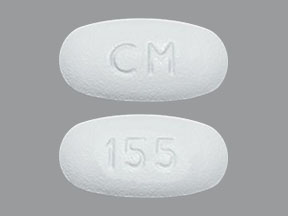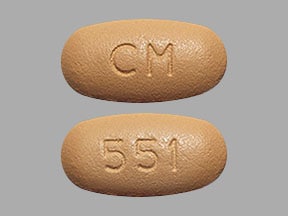Invokamet
Generic name: canagliflozin and metformin
Brand names: Invokamet, Invokamet XR
Drug class: Antidiabetic combinations
What is Invokamet or Invokamet XR?
Invokamet contains 2 prescription medicines called canagliflozin (Invokana) and metformin hydrochloride (Glucophage). Invokamet XR contains 2 prescription medicines called canagliflozin (Invokana) and metformin hydrochloride extended-release (Glumetza).
Invokamet or Invokamet XR can be used along with diet and exercise to lower blood sugar (glucose) in adults with type 2 diabetes, in adults with type 2 diabetes who have known cardiovascular disease and canagliflozin is needed to reduce the risk of major cardiovascular events such as heart attack, stroke, or death, in adults with type 2 diabetes and diabetic kidney disease (nephropathy) with a certain amount of protein in the urine, and canagliflozin is needed to reduce the risk of end stage kidney disease (ESKD), worsening of kidney function, cardiovascular death, and hospitalization for heart failure.
Invokamet or Invokamet XR is not for people with type 1 diabetes. Invokamet or Invokamet XR is not for people with diabetic ketoacidosis (increased ketones in blood or urine).
It is not known if Invokamet or Invokamet XR is safe and effective in children under 18 years of age.
Description
INVOKAMET ® (canagliflozin and metformin HCl) and INVOKAMET ® XR (canagliflozin and metformin hydrochloride extended-release tablets) contain canagliflozin and metformin HCl.
Canagliflozin
Canagliflozin is an inhibitor of sodium-glucose co-transporter 2 (SGLT2), the transporter responsible for reabsorbing the majority of glucose filtered by the kidney. Canagliflozin is chemically known as (1 S)-1,5-anhydro-1-[3-[[5-(4-fluorophenyl)-2-thienyl]methyl]-4-methylphenyl]-D-glucitol hemihydrate and its molecular formula and weight are C 24H 25FO 5S∙1/2 H 2O and 453.53, respectively. The structural formula for canagliflozin is:
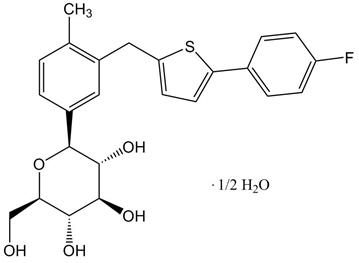
Canagliflozin is practically insoluble in aqueous media from pH 1.1 to 12.9.
Metformin HCl
Metformin HCl is a biguanide chemically known as 1,1-Dimethylbiguanide hydrochloride and its molecular formula and weight are C 4H 11N 5 ∙ HCl and 165.62, respectively. The structural formula for metformin HCl is:
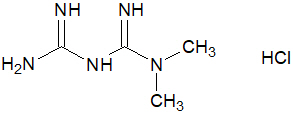
INVOKAMET and INVOKAMET XR
- INVOKAMET/INVOKAMET XR are supplied as film-coated tablets for oral administration. Each 50 mg/500 mg tablet and 50 mg/1,000 mg tablet contains 51 mg of canagliflozin equivalent to 50 mg canagliflozin (anhydrous) and 500 mg or 1,000 mg metformin HCl (equivalent to metformin 389.93 mg and 779.86 mg, respectively).
- Each 150 mg/500 mg tablet and 150 mg/1,000 mg tablet contains 153 mg of canagliflozin equivalent to 150 mg canagliflozin (anhydrous) and 500 mg or 1,000 mg metformin HCl (equivalent to metformin 389.93 mg and 779.86 mg, respectively).
INVOKAMET contains the following inactive ingredients: croscarmellose sodium, hypromellose, magnesium stearate, and microcrystalline cellulose. The magnesium stearate is vegetable-sourced. The tablets are finished with a commercially available film-coating consisting of the following inactive ingredients: macrogol/PEG3350, polyvinyl alcohol (partially hydrolyzed), talc, titanium dioxide, iron oxide yellow (50 mg/1,000 mg and 150 mg/500 mg tablets only), iron oxide red (50 mg/1,000 mg, 150 mg/500 mg and 150 mg/1,000 mg tablets only), and iron oxide black (150 mg/1,000 mg tablets only).
INVOKAMET XR contains the following inactive ingredients: croscarmellose sodium, hydroxypropyl cellulose, hypromellose, lactose anhydrous, magnesium stearate (vegetable-sourced), microcrystalline cellulose, polyethylene oxide, and silicified microcrystalline cellulose (50 mg/500 mg and 50 mg/1,000 mg tablets only). The tablets are finished with a commercially available film-coating consisting of the following inactive ingredients: macrogol/PEG3350, polyvinyl alcohol (partially hydrolyzed), talc, titanium dioxide, iron oxide red, iron oxide yellow, and iron oxide black (50 mg/1,000 mg and 150 mg/1,000 mg tablets only).
INVOKAMET XR tablets provide canagliflozin for immediate-release and metformin HCl for extended-release. Each bilayer tablet is compressed from two separate granulates, one for each active ingredient of the tablet, and finished with a film-coating. The metformin HCl extended-release layer is based on a polymer matrix which controls the drug release by passive diffusion through the swollen matrix in combination with tablet erosion.
Mechanism of Action
Canagliflozin
Sodium-glucose co-transporter 2 (SGLT2), expressed in the proximal renal tubules, is responsible for the majority of the reabsorption of filtered glucose from the tubular lumen. Canagliflozin is an inhibitor of SGLT2. By inhibiting SGLT2, canagliflozin reduces reabsorption of filtered glucose and lowers the renal threshold for glucose (RT G), and thereby increases urinary glucose excretion (UGE).
Canagliflozin increases the delivery of sodium to the distal tubule by blocking SGLT2-dependent glucose and sodium reabsorption. This is believed to increase tubuloglomerular feedback and reduce intraglomerular pressure.
Metformin HCl
Metformin HCl is an antihyperglycemic agent which improves glucose tolerance in patients with type 2 diabetes, lowering both basal and postprandial plasma glucose. Metformin HCl decreases hepatic glucose production, decreases intestinal absorption of glucose, and improves insulin sensitivity by increasing peripheral glucose uptake and utilization. With metformin therapy, insulin secretion remains unchanged while fasting insulin levels and day-long plasma insulin response may decrease.
What is the most important information I should know about Invokamet or Invokamet XR?
Invokamet and Invokamet XR can cause serious side effects, including:
- Lactic Acidosis. Metformin, one of the medicines in Invokamet and Invokamet XR, can cause a rare but serious condition called lactic acidosis (a build-up of lactic acid in the blood) that can cause death. Lactic acidosis is a medical emergency and must be treated in the hospital.
Stop taking Invokamet or Invokamet XR and call your doctor right away if you have any of the following symptoms of lactic acidosis:
Most people who have had lactic acidosis had other conditions that, in combination with metformin use, led to the lactic acidosis. Tell your doctor if you have any of the following, because you have a higher chance for getting lactic acidosis with Invokamet or Invokamet XR if you:
- have severe kidney problems or your kidneys are affected by certain x-ray tests that use injectable dye.
- have liver problems.
- drink alcohol very often or drink a lot of alcohol in short-term “binge” drinking.
- get dehydrated (lose a large amount of body fluids). This can happen if you are sick with a fever, vomiting, or diarrhea. Dehydration can also happen when you sweat a lot with activity or exercise and do not drink enough fluids.
- have surgery.
- have a heart attack, severe infection, or stroke.
- are 65 years of age or older.
The best way to keep from having a problem with lactic acidosis from metformin is to tell your doctor if you have any of the problems in the list above. Your doctor will decide to stop your Invokamet or Invokamet XR for a while if you have any of these things.
- Amputations. Invokamet or Invokamet XR may increase your risk of lower limb amputations. Amputations mainly involve removal of the toe or part of the foot, however, amputations involving the leg, below and above the knee, have also occurred. Some people had more than one amputation, some on both sides of the body.
You may be at a higher risk of lower limb amputation if you:- have a history of amputation
- have heart disease or are at risk for heart disease
- have had blocked or narrowed blood vessels, usually in your leg
- have damage to the nerves (neuropathy) in your leg
- have had diabetic foot ulcers or sores
Call your doctor right away if you have new pain or tenderness, any sores, ulcers, or infections in your leg or foot. Your doctor may decide to stop your Invokamet or Invokamet XR for a while if you have any of these signs or symptoms.
Talk to your doctor about proper foot care.
Invokamet or Invokamet XR can have other serious side effects. See “What are the possible side effects of Invokamet or Invokamet XR?”
Who should not take Invokamet or Invokamet XR?
Do not take Invokamet or Invokamet XR if you:
- have severe kidney problems
- are on kidney dialysis
- have a condition called metabolic acidosis or diabetic ketoacidosis (increased ketones in the blood or urine).
- are allergic to canagliflozin, metformin, or any of the ingredients in Invokamet or Invokamet XR. See the end of this Medication Guide for a list of ingredients in Invokamet and Invokamet XR. Symptoms of an allergic reaction to Invokamet and Invokamet XR may include:
- rash
- raised red patches on your skin (hives)
- swelling of the face, lips, mouth, tongue, and throat that may cause difficulty in breathing or swallowing
What should I tell my healthcare provider before taking Invokamet or Invokamet XR?
Before taking Invokamet or Invokamet XR, tell your doctor about all of your medical conditions, including if you:
- have a history of amputation.
- have heart disease or are at risk for heart disease.
- have had blocked or narrowed blood vessels, usually in your leg.
- have damage to the nerves (neuropathy) in your leg.
- have had diabetic foot ulcers or sores.
- have moderate to severe kidney problems.
- have liver problems.
- have a history of urinary tract infections or problems with urination.
- are on a low sodium (salt) diet. Your doctor may change your diet or your dose of Invokamet or Invokamet XR.
- have ever had an allergic reaction to Invokamet or Invokamet XR.
- are going to get an injection of dye or contrast agents for an x-ray procedure. Invokamet or Invokamet XR may need to be stopped for a short time. Talk to your doctor about when you should stop Invokamet or Invokamet XR and when you should start Invokamet or Invokamet XR again. See “What is the most important information I should know about Invokamet or Invokamet XR?”
- have heart problems, including congestive heart failure.
- are going to have surgery. Your doctor may stop your Invokamet or Invokamet XR before you have surgery. Talk to your doctor if you are having surgery about when to stop taking Invokamet or Invokamet XR and when to start it again.
- are eating less or there is a change in your diet.
- have or have had problems with your pancreas, including pancreatitis or surgery on your pancreas.
- drink alcohol very often or drink a lot of alcohol in the short-term (“binge” drinking).
- have low levels of vitamin B12 or calcium in your blood.
- are pregnant or plan to become pregnant. Invokamet or Invokamet XR may harm your unborn baby. If you become pregnant while taking Invokamet or Invokamet XR, tell your doctor as soon as possible. Talk with your doctor about the best way to control your blood sugar while you are pregnant.
- are a premenopausal woman (before the “change of life”), who does not have periods regularly or at all. Invokamet or Invokamet XR may increase your chance of becoming pregnant. Talk to your doctor about birth control choices while taking Invokamet or Invokamet XR, if you are not planning to become pregnant. Tell your doctor right away if you become pregnant while taking Invokamet or Invokamet XR.
- are breastfeeding or plan to breastfeed. Invokamet or Invokamet XR may pass into your breast milk and may harm your baby. Talk with your doctor about the best way to feed your baby if you are taking Invokamet or Invokamet XR. Do not breastfeed while taking Invokamet or Invokamet XR.
Tell your doctor about all the medicines you take, including prescription and over-the-counter medicines, vitamins, and herbal supplements.
Invokamet or Invokamet XR may affect the way other medicines work and other medicines may affect how Invokamet or Invokamet XR works. Especially tell your doctor if you take:
- diuretics (water pills)
- phenytoin or phenobarbital (used to control seizures)
- digoxin (used to treat heart problems)
- rifampin (used to treat or prevent tuberculosis)
- ritonavir (used to treat HIV infection)
Ask your doctor or pharmacist for a list of these medicines if you are not sure if your medicine is listed above.
Know the medicines you take. Keep a list of them and show it to your doctor and pharmacist when you get a new medicine.
How should I take Invokamet or Invokamet XR?
- If you are prescribed Invokamet, take by mouth 2 times each day with meals exactly as your doctor tells you to take it. Taking Invokamet with meals may lower your chance of having an upset stomach.
- If you are prescribed Invokamet XR, take by mouth 1 time each day with the morning meal exactly as your doctor tells you to take it. Taking Invokamet XR with a meal may lower your chance of having an upset stomach.
- Swallow Invokamet XR whole. Do not crush, cut, or chew.
- You may sometimes pass a soft mass in your stools (bowel movement) that looks like Invokamet XR tablets. It is normal to see this in your stool.
- Your doctor may change your dose if needed.
- Your doctor may tell you to take Invokamet or Invokamet XR along with other diabetes medicines. Low blood sugar can happen more often when Invokamet or Invokamet XR is taken with certain other diabetes medicines. See “What are the possible side effects of Invokamet or Invokamet XR?”
- If you miss a dose of Invokamet, take it as soon as you remember. If it is almost time for your next dose, skip the missed dose and take the medicine at the next regularly scheduled time. Do not take 2 tablets of Invokamet at the same time. Talk to your doctor if you have questions about a missed dose.
- If you miss a dose of Invokamet XR, take it as soon as you remember. If it is almost time for your next dose, skip the missed dose and take the medicine at the next regularly scheduled time. Do not take more than 2 tablets of Invokamet XR at the same time. Talk to your doctor if you have questions about a missed dose.
- If you take too much Invokamet or Invokamet XR, call your doctor or go to the nearest hospital emergency room right away.
- When your body is under some types of stress, such as fever, trauma (such as a car accident), infection, or surgery, the amount of diabetes medicine you need may change. Tell your doctor right away if you have any of these conditions and follow your doctor’s instructions.
- Stay on your prescribed diet and exercise program while taking Invokamet or Invokamet XR.
- Check your blood sugar as your doctor tells you to.
- Invokamet and Invokamet XR will cause your urine to test positive for glucose.
- Your doctor may do certain blood tests before you start Invokamet or Invokamet XR and during treatment as needed. Your doctor may change your dose of Invokamet or Invokamet XR based on the results of your blood tests.
- Your doctor will check your diabetes with regular blood tests, including your blood sugar levels and your hemoglobin A1C.
What should I avoid while taking Invokamet or Invokamet XR?
- Avoid drinking alcohol very often or drinking a lot of alcohol in a short period of time (“binge” drinking). It can increase your chances of getting serious side effects.
What are the possible side effects of Invokamet and Invokamet XR?
Invokamet or Invokamet XR may cause serious side effects including:
- See “What is the most important information I should know about Invokamet or Invokamet XR?”
- dehydration. Invokamet or Invokamet XR can cause some people to become dehydrated (the loss of too much body water). Dehydration may cause you to feel dizzy, faint, lightheaded, or weak, especially when you stand up (orthostatic hypotension).
You may be at higher risk of dehydration if you:
- have low blood pressure
- take medicines to lower your blood pressure, including diuretics (water pill)
- are on a low sodium (salt) diet
- have kidney problems
- are 65 years of age or older
Talk to your doctor about what you can do to prevent dehydration including how much fluid you should drink on a daily basis.
- ketoacidosis (increased ketones in your blood or urine). Ketoacidosis has happened in people who have type 1 diabetes or type 2 diabetes, during treatment with canagliflozin, one of the medicines in Invokamet and Invokamet XR. Ketoacidosis has also happened in people with diabetes who were sick or who had surgery during treatment with Invokamet or Invokamet XR. Ketoacidosis is a serious condition, which needs to be treated in a hospital. Ketoacidosis may lead to death. Ketoacidosis can happen with Invokamet or Invokamet XR, even if your blood sugar is less than 250 mg/dL. Stop taking Invokamet or Invokamet XR and call your doctor right away if you get any of the following symptoms:
- nausea
- vomiting
- stomach area (abdominal) pain
- tiredness
- trouble breathing
If you get any of these symptoms during treatment with Invokamet or Invokamet XR, if possible, check for ketones in your urine, even if your blood sugar is less than 250 mg/dL.
- kidney problems. Sudden kidney injury has happened to people taking Invokamet or Invokamet XR. Talk to your doctor right away if you:
- reduce the amount of food or liquid you drink for example, if you are sick or cannot eat or
- you start to lose liquids from your body for example, from vomiting, diarrhea or being in the sun too long.
- serious urinary tract infections. Serious urinary tract infections that may lead to hospitalization have happened in people who are taking canagliflozin, one of the medicines in Invokamet and Invokamet XR. Tell your doctor if you have any signs or symptoms of a urinary tract infection such as a burning feeling when passing urine, a need to urinate often, the need to urinate right away, pain in the lower part of your stomach (pelvis), or blood in the urine. Sometimes people may also have a fever, back pain, nausea, or vomiting.
- low blood sugar (hypoglycemia). If you take Invokamet or Invokamet XR with another medicine that can cause low blood sugar, such as a sulfonylurea or insulin, your risk of getting low blood sugar is higher. The dose of your sulfonylurea medicine or insulin may need to be lowered while you take Invokamet or Invokamet XR. Signs and symptoms of low blood sugar may include:
- headache
- confusion
- hunger
- shaking or feeling jittery
- drowsiness
- dizziness
- fast heartbeat
- weakness
- irritability
- sweating
- a rare but serious bacterial infection that causes damage to the tissue under the skin (necrotizing fasciitis) in the area between and around the anus and genitals (perineum). Necrotizing fasciitis of the perineum has happened in women and men who take canagliflozin, one of the medicines in Invokamet and Invokamet XR. Necrotizing fasciitis of the perineum may lead to hospitalization, may require multiple surgeries, and may lead to death. Seek medical attention immediately if you have a fever or you are feeling very weak, tired or uncomfortable (malaise) and you develop any of the following symptoms in the area between and around your anus and genitals:
- pain or tenderness
- swelling
- redness of the skin (erythema)
- vaginal yeast infection. Women who take Invokamet or Invokamet XR may get vaginal yeast infections. Symptoms of a vaginal yeast infection include:
- vaginal odor
- white or yellowish vaginal discharge (discharge may be lumpy or look like cottage cheese)
- vaginal itching
- yeast infection of the penis (balanitis or balanoposthitis). Men who take Invokamet or Invokamet XR may get a yeast infection of the skin around the penis. Certain men who are not circumcised may have swelling of the penis that makes it difficult to pull back the skin around the tip of the penis. Other symptoms of yeast infection of the penis include:
- redness, itching, or swelling of the penis
- foul smelling discharge from the penis
- rash of the penis
- pain in the skin around the penis
Talk to your doctor about what to do if you get symptoms of a yeast infection of the vagina or penis. Your doctor may suggest you use an over-the-counter antifungal medicine. Talk to your doctor right away if you use an over-the-counter antifungal medication and your symptoms do not go away.
- serious allergic reaction. If you have any symptoms of a serious allergic reaction, stop taking Invokamet or Invokamet XR and call your doctor right away or go to the nearest hospital emergency room. See “Do not take Invokamet or Invokamet XR if you:”. Your doctor may give you a medicine for your allergic reaction and prescribe a different medicine for your diabetes.
- broken bones (fractures). Bone fractures have been seen in patients taking canagliflozin. Talk to your doctor about factors that may increase your risk of bone fracture.
- low vitamin B12 (vitamin B12 deficiency). Using metformin for long periods of time may cause a decrease in the amount of vitamin B12 in your blood, especially if you have had low vitamin B12 blood levels before. Your doctor may do blood tests to check your vitamin B12 levels.
Other common side effects of Invokamet or Invokamet XR include:
- nausea and vomiting
- gas
- diarrhea
- upset stomach
- weakness
- indigestion
- headache
- changes in urination, including urgent need to urinate more often, in larger amounts, or at night
These are not all the possible side effects of Invokamet or Invokamet XR.
Call your doctor for medical advice about side effects. You may report side effects to FDA at 1-800-FDA-1088.
You may also report side effects to Janssen Pharmaceuticals, Inc. at 1-800-526-7736.
General information about the safe and effective use of Invokamet and Invokamet XR
Medicines are sometimes prescribed for purposes other than those listed in a Medication Guide. Do not use Invokamet or Invokamet XR for a condition for which it was not prescribed. Do not give Invokamet or Invokamet XR to other people, even if they have the same symptoms you have. It may harm them.
You can ask your pharmacist or doctor for information about Invokamet or Invokamet XR that is written for healthcare professionals.
For more information about Invokamet or Invokamet XR, call 1-800-526-7736 or visit our website at www.invokamet.com.
How should I store Invokamet or Invokamet XR?
- Store Invokamet or Invokamet XR at room temperature between 68°F to 77°F (20°C to 25°C).
- Store Invokamet or Invokamet XR in the original container to protect from moisture. Storage in a pill box or pill organizer is allowed for up to 30 days.
Keep Invokamet and Invokamet XR and all medicines out of the reach of children.
What are the ingredients in Invokamet and Invokamet XR?
Active ingredients: canagliflozin and metformin hydrochloride
Inactive ingredients:
Invokamet: The tablet core contains croscarmellose sodium, hypromellose, magnesium stearate, and microcrystalline cellulose. The magnesium stearate is vegetable-sourced. In addition, the tablet coating contains Macrogol/PEG3350, polyvinyl alcohol (partially hydrolyzed), talc, titanium dioxide, iron oxide yellow (50 mg/1,000 mg and 150 mg/500 mg tablets only), iron oxide red (50 mg/1,000 mg, 150 mg/500 mg and 150 mg/1,000 mg tablets only), and iron oxide black (150 mg/1,000 mg tablets only).
Invokamet XR: The tablet core contains croscarmellose sodium, hydroxypropyl cellulose, hypromellose, lactose anhydrous, magnesium stearate (vegetable-sourced), microcrystalline cellulose, polyethylene oxide, and silicified microcrystalline cellulose (50 mg/500 mg and 50 mg/1,000 mg tablets only). In addition, the tablet coating contains macrogol/PEG3350, polyvinyl alcohol (partially hydrolyzed), talc, titanium dioxide, iron oxide red, iron oxide yellow, and iron oxide black (50 mg/1,000 mg and 150 mg/1,000 mg tablets only).
Label
PRINCIPAL DISPLAY PANEL – 50 MG/500 MG TABLET BOTTLE LABEL – 540
- NDC 50458-540-60
60 tablets - Invokamet ®
(canagliflozin and
metformin HCl)
Tablets 50 mg/500 mg - Dispense with Medication Guide
- Store and Dispense in the original container.
May be stored in a pill box for up to 30 days. - janssen
- Rx only
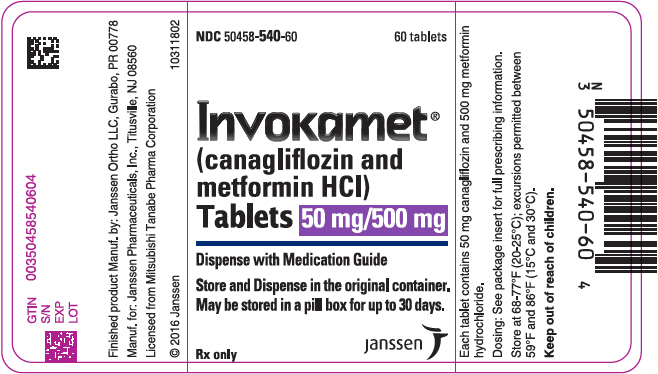
PRINCIPAL DISPLAY PANEL – 50 MG/1,000 MG TABLET BOTTLE LABEL – 541
- NDC 50458-541-60
60 tablets - Invokamet ®
(canagliflozin and
metformin HCl)
Tablets 50 mg/1,000 mg - Dispense with Medication Guide
- Store and Dispense in the original container.
- May be stored in a pill box for up to 30 days.
- janssen
- Rx only
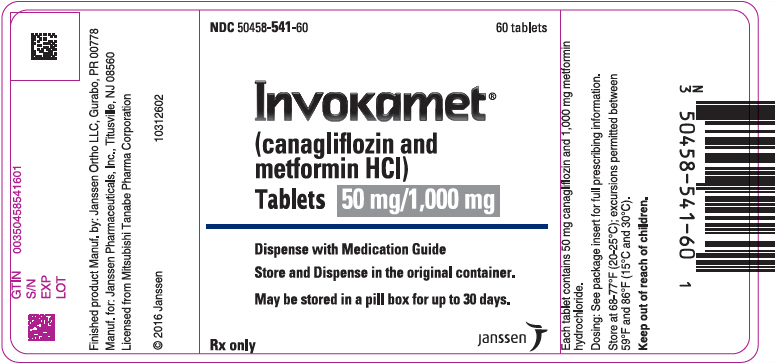
PRINCIPAL DISPLAY PANEL – 150 MG/500 MG TABLET BOTTLE LABEL – 542
- NDC 50458-542-60
60 tablets - Invokamet ®
(canagliflozin and
metformin HCl)
Tablets 150 mg/500 mg - Dispense with Medication Guide
- Store and Dispense in the original container.
- May be stored in a pill box for up to 30 days.
- janssen
- Rx only
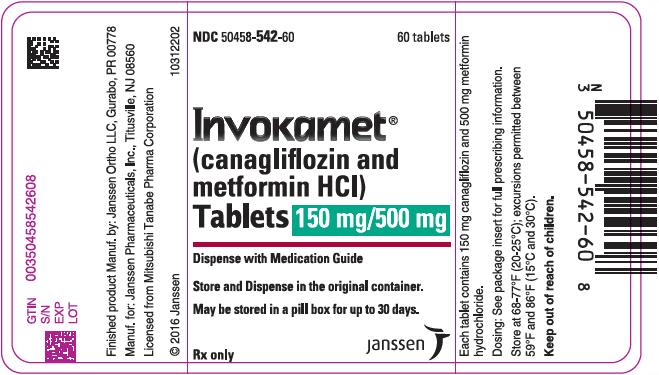
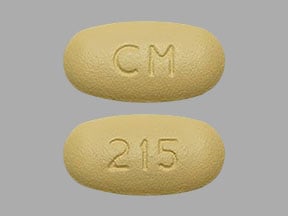
SRC: NLM .

